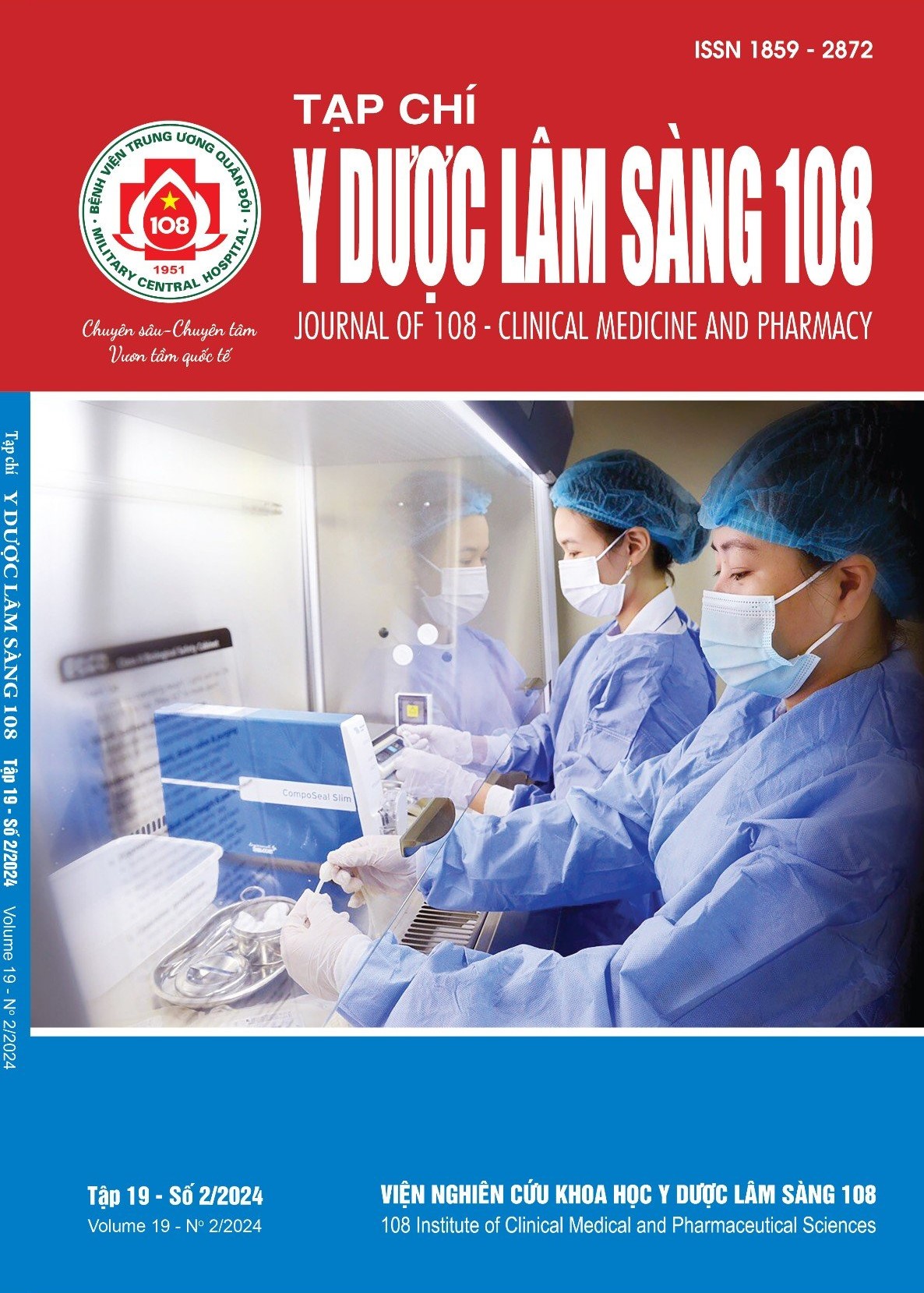Outcome of using antithymocyte globulin (ATG) induction for low immune risk kidney transplant recipients
Main Article Content
Keywords
Abstract
Objective: To evaluate the outcomes of using antithymocyte globulin (ATG) induction for low-risk renal transplant recipients. Subject and method: A prospective descriptive longitudinal study of 40 low risk renal transplant patients, taking ATG at 108 Military Central Hospital from 3/2023 to 01/2024.
Result: Transplanted renal function enhanced significantly: Serum creatinine and estimated glomerular filtration rate (eGFR) was 272.37umol/L and 34.78ml/min/1.73m2 on the first day, 102.7umol/L and 70.12ml/min/1.73m2 on 3rd month postoperative. The rate of delayed renal function was 7.5% of acute graft rejection was 7.5% of organ recovery was 100%, rate of postoperative neutropenia was 10%, rate of urinary tract infection was 17.5%, rate of BK virus infection was 17.5%, rate of CMV infection was 10%. Conclusion: ATG was a safe and efficient induction immunosuppression therapy for low-risk renal transplantation.
Article Details
References
2. Kidney Disease: Improving Global Outcomes (KDIGO) Transplant Work Group (2009) KDIGO clinical practice guideline for the care of kidney transplant recipients. Am J Transplant. 2009 Nov;9 Suppl 3:S1-155. doi: 10.1111/j.1600-6143.2009.02834.x. PMID: 19845597.
3. Hardinger KL, Brennan DC, Schnitzler MA (2009) Rabbit antithymocyte globulin is more beneficial in standard kidney than in extended donor recipients. Transplantation 87(9): 1372-1376.
4. Hong SY, Kim YS, Jin K et al (2023) The comparative efficacy and safety of basiliximab and antithymocyte globulin in deceased donor kidney transplantation:
A multicenter cohort study. Kidney Res Clin Pract 42(1): 138-148.
5. Kim SJ, Rhu J, Yoo H, Kim K, Lee KW, Park JB (2020) Outcome comparison between low-dose rabbit anti-thymocyte globulin and basiliximab in low-risk living donor kidney transplantation. Journal of clinical medicine 9(5).
6. Martinez-Mier G, Moreno-Ley PI, Budar-Fernández LF et al (2021) Low-dose thymoglobulin vs basiliximab induction therapy in low-risk living related kidney transplant recipients: a prospective randomized trial. Transplantation Proceedings 53(3): 1005-1009.
7. Ngoc TDT, Phuong DT, Diem TH, Tuan ADN, Van MB, Pham C (2016) Prevalence rate of CMV infection in patients after kidney transplantation in VietNam. EJPMR 3(5): 98-106.
8. Montero C, Yomayusa N, Torres R et al (2023) Low dose thymoglobulin versus basiliximab in cytomegalovirus positive kidney transplant recipients: Effectiveness of preemptive cytomegalovirus modified strategy. Nefrología (English Edition) 43(2): 213-223.
9. Thomusch O, Wiesener M, Opgenoorth M et al (2016) Rabbit-ATG or basiliximab induction for rapid steroid withdrawal after renal transplantation (Harmony): An open-label, multicentre, randomised controlled trial. Lancet (London, England) 388(10063): 3006-3016.
10. Hill P, Cross NB, Barnett AN, Palmer SC, Webster AC (2017) Polyclonal and monoclonal antibodies for induction therapy in kidney transplant recipients. The Cochrane database of systematic reviews 1(1): Cd004759.
11. Mourad G, Rostaing L, Legendre C, Garrigue V, Thervet E, Durand D (2004) Sequential protocols using basiliximab versus antithymocyte globulins in
renal-transplant patients receiving mycophenolate mofetil and steroids. Transplantation 78(4): 584-590.
 ISSN: 1859 - 2872
ISSN: 1859 - 2872
